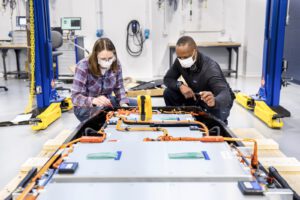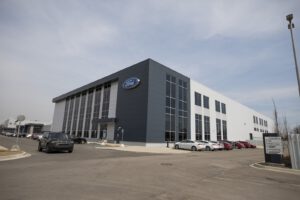
Ford Motor Co. will invest $185 million to open up a new battery development center, a critical step in what was already a $22 billion electrification effort.
The new Ion Labs will help the Detroit automaker accelerate development of next-generation batteries, company officials explained during a Tuesday morning media conference. The new facility will be crucial, said Hau Thai-Tang, the automaker’s chief product platform and operations officer, as Ford has “accelerated our ambitions” in the battery-electric vehicle market compared to just 18 months ago.
“We’re much more bullish and aggressive on how fast we think this transition (to battery-electric vehicles) is going to play out,” than in the recent past, Thai-Tang said in response to a question from TheDetroitBureau.com.
Ford charges up its EV efforts

That will mean more Ford BEVs sooner than were previously planned, the executive indicated. It also means Ford is giving serious thought to setting up its own battery production operations. Currently, it relies on outside vendors for those key components. But there are some caveats.
The auto industry is accelerating the shift from internal combustion engines to electrified vehicles, especially those relying solely on battery power. That’s due, in part, to increasingly stringent global mileage and emissions standards. The Biden administration faces pressure to follow the lead of countries like Britain setting up timetables to phase out ICE technology.
There’s also a growing sense of public acceptance. Electrified vehicles of all forms experienced an 81% sales surge during the first quarter compared to the same period in 2020, according to Cox Automotive. Demand for BEVs, in particular, is amping up rapidly as new offerings come to market. Ford dealers have about a seven-day supply of the new Mach-E SUV in stock in an industry where 60 days of inventory is considered normal.
Ford has confirmed several more BEVs, including a version of the big F-150 pickup and the Transit van, which is set to begin production later this year. And it has set a timetable for phasing out gas and diesel products in Europe. Insiders told TheDetroitBureau.com that Jim Farley has been giving the green light to even more all-electric products since he became CEO last autumn.
Advanced batteries likely to be key to public acceptance

A variety of factors will impact public acceptance, according to industry analysts, including the availability of public charging stations — something the Biden administration hopes to address. But improved batteries will be the linchpin, leading to longer range, shorter charging times and lower costs, among other things.
That’s where Ford’s new Ion Labs will play a crucial role. The $185 million facility will be built somewhere in Southeast Michigan — Ford’s not yet ready to reveal the precise location. The 200,000 square-foot facility will be a “cross-functional” operation, according to new director, Anand Sankaran. It will have a staff of about 150. Some will be existing Ford employees, but others will be new hires.
Ion Labs’ focus will be development and testing new battery technology. A key goal will be making sure new chemistries can “scale up” to the level of production needed for automotive applications, said Sankaran.
Solid-state batteries could be the game changer
The lab will look at not only today’s state-of-the-art lithium-ion batteries but also potential future technologies, notably solid-state batteries. These are expected to increase range, cut charging times, lower costs and also reduce the risk of battery fires.

Ford isn’t the only automaker looking at solid-state batteries. Honda calls the technology essential to its own BEV plans.
What Ion Labs learns about that technology will be be critical to Ford’s long-term manufacturing strategy.
New CEO Farley changes course
Jim Hackett, Ford’s recently retired CEO, preferred relying on outside vendors for batteries. South Korea’s SK Innovation provides the lithium-ion cells used in BEVs like the Mustang Mach-E. Farley may change course, company officials noted on Tuesday. But Ford isn’t rushing to set up a battery plant — unlike competitors including General Motors and Mercedes-Benz.
Battery manufacturing is a capital-intensive business, Thai-Tang stressed. Ford needs to make sure it will have the BEV sales volume to justify that investment, for one thing. But there’s another concern.
“We want to make sure that if the technology shifts from lithium-ion to solid-state we can reuse as much of the manufacturing process and those capital-intensive processes as possible,” he explained.
Ford doesn’t want to spend what could be $1 billion or more to set up a lithium-ion plant now if it might have to start all over again in a couple years when solid-state or some other new battery technology is ready for production.
So, what comes out of the new Ion Labs likely will have a significant impact on Ford’s long-term battery-car program. The new facility is set to be fully operational by late 2022.







